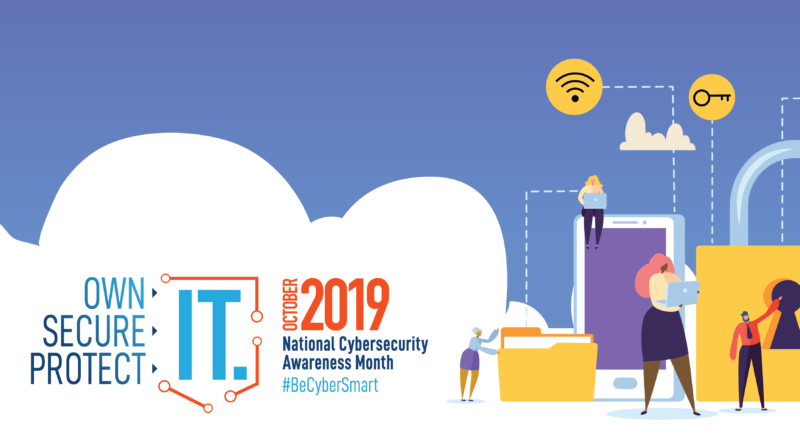Cybersecurity Awareness Tips
October was National Cybersecurity Awareness Month. This year there were 3 themes: Own IT. Secure IT. Protect IT.
Here are some proactive steps we can take to stay cyber secure at home and at work. We’ll be running a few more articles like this one over the next several weeks to help you stay cybersecure.
Own IT
The Internet touches almost every aspect of our lives. We can shop, bank, connect with family and friends, and handle our medical records all online. These activities require you to provide personally identifiable information such as your name, date of birth, account numbers, passwords, and location information. Be cyber smart when sharing personal information online to reduce the risk of becoming a cybercrimes victim.
SIMPLE TIPS TO OWN IT
- Double your login protection by enabling multi-factor authentication (MFA). By using multiple methods to confirm your identity, you can ensure that the only one accessing your accounts is you. Use it for email, banking, social media, and any other service that requires logging in. If MFA is an option, enable it by using a trusted mobile device, such as your smartphone or an authenticator app.
- Shake up your password protocol. Use the longest password or passphrase permissible. Always use different passwords for different sites, to prevent cyber criminals from gaining access and to protect you in the event of a breach. Use password managers to generate and remember different, complex passwords for each of your accounts.
- Update the software on your own devices to the latest version available. Turn on automatic updates so you don’t have to think about maintaining your security, and set your security software to run regular scans.
- Never click and tell. Limit what information you post on social media – from personal addresses to where you like to grab coffee. These seemingly random details are all that criminals need to know to target you, your loved ones, and your physical belongings – online and in the real world.
- Keep Social Security numbers, account numbers, and passwords private.
- Disable location services that allow just anyone to see where you are at any given time. Remember, unless you disable geotagging and location services, photos taken on your phone can contain embedded location data, so even uploading a picture can give away important information about your whereabouts.
- Keep tabs on your apps. Don’t let apps gather your personal information without your knowledge. Check your app permissions and use the “rule of least privilege” to delete what you don’t need or no longer use. Learn to just say “no” to privilege requests that don’t make sense. Only download apps from trusted vendors and sources.
- Stay protected while connected. Before you connect to any public wireless hotspot – such as at an airport, hotel, or café – be sure to confirm the name of the network and exact login procedures with appropriate staff to ensure that the network is legitimate. Your personal hotspot is a safer alternative to free Wi-Fi.
- Only use sites that begin with “https” when online shopping or banking. The ‘S’ stands for secure.







